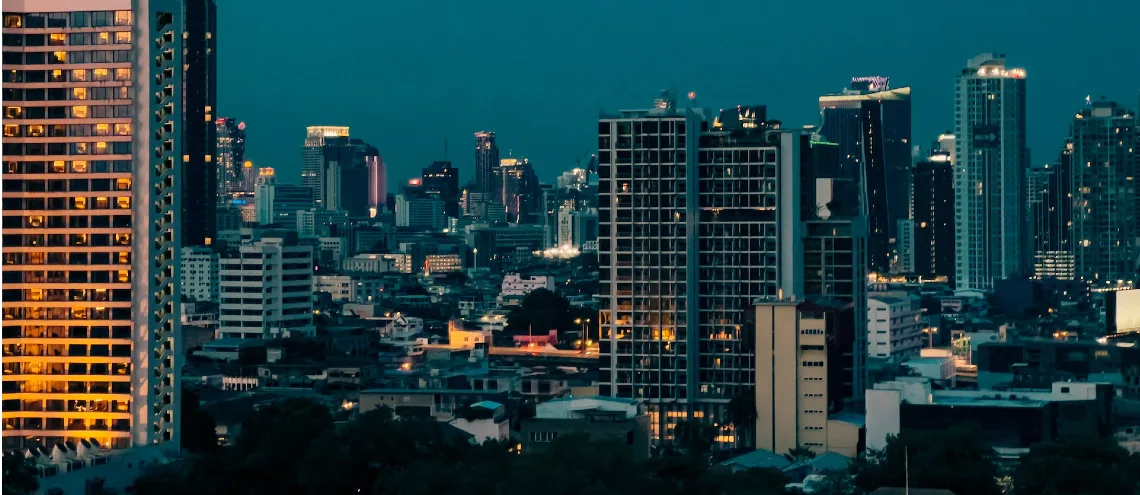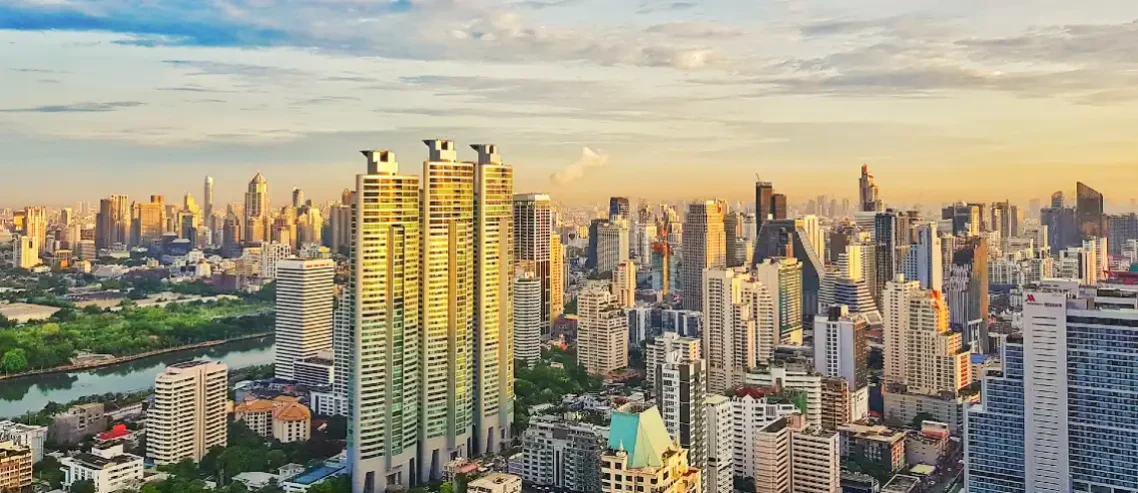A Comprehensive Guide to Thailand’s Long-Term Resident (LTR) Visa
Thailand’s long-term resident (LTR) visa is a dream come true for high-net-worth individuals (HNWIs), highly-skilled individuals, and others who are keen on moving to the Land of Smiles. If you’re looking for a second home or somewhere to retire, Thailand’s latest 10-year visa could be the answer.
Whether you’re currently living in Thailand on a non-immigrant visa and are tired of yearly renewals or are simply exploring your Thai visa options for living in the country long term, the LTR visa scheme, which came into effect on September 1st, 2022, is an attractive option worth understanding.
From eligibility requirements to benefits and beyond, this Pacific Prime Thailand article covers all the details of Thailand’s long-term resident visa, ending with how Pacific Prime can help with your health insurance needs.
Thinking about relocating to Thailand? Our ultimate guide for expats moving to Thailand is a must-read.
What is Thailand’s Long-Term Resident (LTR) Visa?
The long-term resident (LTR) visa in Thailand came into effect in 2022 to attract high-net-worth individuals (HNWIs), highly-skilled professionals, work-from-Thailand professionals, and wealthy retirees who will benefit from a range of tax and non-tax benefits during their time in the country.
Reasons for Introducing the Long-Term Resident (LTR) Visa Program
In the context of a struggling economy post-COVID-19 and talent shortage (especially in the digital sector, including in the areas of blockchain, data science, and artificial intelligence), the new visa aimed at wealthy foreigners and skilled professionals is a welcome addition for the country.
As Thanakorn Wangboonkongchana, a spokesperson for the government, said that Thailand forecasts that one million new foreign residents over five years (2022 to 2026) will generate the following:
- THB ฿1 trillion of spending;
- THB ฿800 billion of investment; and
- THB ฿270 billion in tax income.
It is also expected to attract new foreign residents, staffing, highly skilled workers, digital nomads, and new investments in technologies and infrastructure.
What Are the Benefits for Long-Term Resident Visa Holders?
When it comes to foreign applicants, Thailand’s long-term resident (LTR) visa offers many benefits, including a renewable 10-year visa and a 1-year report (instead of 90 days). LTR visa holders won’t need to worry about visa matters for the next decade while receiving tax and non-tax benefits.
The complete list of benefits includes:
- A 10 years visa that’s renewable
- Exemption from the “four Thais to one foreigner” employment requirement ratio
- Fast track service at international airports in Thailand
- Extension of the 90-day report to a one-year report
- Exemption from re-entry permit requirements
- Permission to work in Thailand via a “digital work permit”
- 17% personal income tax for highly-skilled professionals
- Immigration and work permit facilitation services at the One-Stop Service Center for Visa and Work Permit
Applying for the LTR visa means you will have access to a select number of privileges that will benefit you financially and offer you a better experience in Thailand. Here’s a closer look at the main ones you should know about.
10-year Renewable Visa
You will be granted permission to stay in Thailand for the first 5 years, after which you can extend for another 5 years, provided you fulfill all the requirements, including having an approved health insurance plan.
Exemption from the 4 Thais to 1 Foreigner Employment Requirement Ratio
This is normally a requirement set out by the Board of Investment (BOI) in Thailand, but long-term resident (LTR) visa holders are exempt from it.
Fast Track Service at International Airports in Thailand
If you travel in and out of the country often, this privilege offers air travelers the best experience.
90-day Reporting Extended to 1 Year
Long-term resident (LTR) visa holders are exempt from re-entry permits and can report yearly at immigration instead of every 90 days.
Multiple Re-entry Permits and Permission to Work in Thailand (Digital Work Permit)
This can be attractive to long-term resident (LTR) visa holders who frequently travel for business or pleasure and want a permit to work legally in Thailand.
17% Personal Income Tax for Highly Skilled Professionals
Professionals in the targeted industries will need to pay a 17% tax on their income for the tax year. This is attractive, especially for those who receive their pay in Thailand. Additionally, workers on long-term resident (LTR) visas will be exempt from paying for overseas income.
Long-term Resident (LTR) Visa Holders Can Visit the One-Stop Service Center for Visas and Work Permits
To offer convenience and access to immigration services, long-term resident (LTR) visa holders can travel to Chamchuri Square in Bangkok for all their work and visa inquiries.
Who Is Eligible to Apply for the Long-Term Resident (LTR) Visa?

Financial requirements are vital for the new long-term resident (LTR) visa program, though the exact amount depends on the category you fall into. For example, wealthy global citizens need at least USD $1 million in assets while wealthy pensioners must have a monthly personal income of USD $80,000.
The LTR visa is offered to 4 categories of individuals, namely:
- Wealthy global citizens (including HNWIs),
- Wealthy pensioners (aged 50 years and older),
- Work-from-Thailand professionals (including digital nomads), and
- Highly-skilled professionals (ranging from digital specialists to manufacturing experts and teachers).
In addition to the above, spouses and dependents of LTR visa holders are also eligible for the same visa.
If you don’t meet the requirements, there’s no need to fret as you’ve still got plenty of options. You can check out our Thailand visa guide to learn more about the various other routes to calling the country your home.
Requirements for Categories of Foreigners Offered the Long-Term Resident (LTR) Visas in Thailand
If you’re hoping to apply for a long-term resident (LTR) visa and fit into any of the aforementioned four categories, such as a wealthy global citizen or a highly-skilled professional, you’ll need to ensure you meet the following requirements in order to be approved for the new visa scheme.
Wealthy Global Citizens
Expats who are high-net-worth individuals (HNWIs) from abroad must meet the following requirements when applying for an LTR visa.
- At least USD $1 million in assets.
- A minimum of USD $80,000/year of personal income for the past 2 years.
- Direct investments of at least USD $500,000 in Thai government bonds, foreign direct investment, or Thai property/real estate.
- A health insurance plan with at least USD $50,000 inpatient coverage, social security benefits covering inpatient and/or outpatient treatment in Thailand, or at least a USD $100,000 deposit.
Note: Wealthy expats from abroad should consider comprehensive expat health insurance for Thailand that offers high limits and is tailored to their needs. See the end of the article for more about insurance.
Wealthy Pensioners
The Wealthy Pensioners category is ideal for retirees aged 50 years and older who have either a stable income or an annual pension. Applicants must have one of the following:
- Personal income of at least USD $80,000 per year at the time of application.
- Personal income of no less than USD $40,000 per year and investments of at least USD $250,000 in Thai government bonds, foreign direct investment, or Thai property.
Additionally, applicants must have a health insurance plan with at least USD $50,000 inpatient coverage, social security benefits covering inpatient and/or outpatient treatment in Thailand, or at least a USD $100,000 deposit.
Work-from-Thailand Professionals (including Digital Nomads)

Individuals who work for a well-established company outside of Thailand and are allowed to work from another country, including remote workers, digital nomads, and contractors, can apply for the LTR visa, provided they meet the following requirements.
- Personal income of at least USD $80,000 per year in the past two years.
- A Master’s degree or higher, own intellectual property, or receive Series A funding if their income is below USD $80,000 per year but no less than USD $40,000 per year in the past 2 years.
- At least 5 years of work experience in the relevant industries of the current employment over the past 10 years.
- Been working for a public company listed on a stock exchange or a private company for at least 3 years with a combined revenue of at least USD $150 million in the last 3 years.
- A health insurance plan with at least USD $50,000 inpatient coverage, social security benefits covering inpatient and/or outpatient treatment in Thailand, or at least a USD $100,000 deposit.
Highly-Skilled Professionals
This category applies to professionals or experts in targeted industries working for business entities, higher education institutes, research centers, specialized training institutions in Thailand, or Thai government agencies. Applicants for this category must meet the following requirements.
- Personal income of at least USD $80,000 per year in the past two years.
- A Master’s degree or higher in science, technology, or a specific area of expertise, if the salary band is between USD $40,000 – 80,000.
- At least 5 years of work experience in the targeted industries, except for those with a Ph.D. or applicants whose jobs are assigned to a Thai government agency.
- A health insurance plan with at least USD $50,000 inpatient coverage, social security benefits covering inpatient and/or outpatient treatment in Thailand, or at least a USD $100,000 deposit.
How to Apply for Long-Term Resident (LTR) Visa
If you fulfill the long-term resident (LTR) visa requirements set out above, then you can register and submit your application for qualifications endorsement and supporting documents via the Board of Investment’s (BOI) online visa service.
Once the completed and valid documents have been received, your application will be registered and sent to the relevant agencies (e.g. BOI, Immigration Bureau, etc.) for qualifications endorsement. You will be notified about the qualifications endorsement result within 20 working days
Note: Processing time may vary if additional documents or information are needed.
After the application has been approved, you’ll be asked to submit additional information and documents for the pre-approval process, which takes up to 3 working days (or longer if additional documents are required).
Following the approval of the pre-approval request, you will be able to make an appointment for the LTR Visa issuance at a Royal Thai Embassy or Consulate overseas or at the One-Stop Service Center for Visas and Work Permits in Bangkok. within 60 days following the issuance date of the letter.
Work Permit Issuance

If you have an LTR visa and wish to work in Thailand, there are certain steps you must follow. To start, you need to apply for a work permit through the LTR visa application system as soon as you receive your LTR visa or before you start working in the country.
This process usually takes 3 to 5 working days, though it can take longer if more documents are requested. After your work permit is approved, you can schedule an appointment to collect it at the Department of Employment in the One-Stop Service Center for Visas and Work Permits in Bangkok.
It’s important to note that you are permitted to work in Thailand temporarily without a work permit while the work permit request is being processed. Similarly, work-from-Thailand professionals are not granted a work permit since this category is for foreign professionals who work remotely for a foreign employer.
Without a Thai employer, the digital work permit system won’t be able to grant you a work permit.
How Much Does the Long-Term Resident (LTR) Visa Cost?
In 2022, Thailand’s Cabinet revealed that they will halve the Long-Term Resident (LTR) visa fee from THB ฿100,000 to THB ฿50,000 in an attempt to make the Land of Smiles more attractive to potential applicants to those who wish to stay in the kingdom for 10 years.
However, it’s important to note that the fees may vary and be more expensive than THB ฿50,000 per person per 10 years outside of Thailand (i.e. if you collect the LTR visa at a Royal Thai Embassy or Consulate). What’s more, exchange rates do apply.
Along with meeting the minimum financial requirements, LTR visa applicants in all of the aforementioned categories must either have:
- Health insurance with a minimum coverage of USD $50,000. This is meant to cover any medical fees for their first 10 months in the country at a minimum.
- A social security certificate to cover medical expenses.
- A cash deposit of USD $100,000 or more. The funds must be in either a domestic or foreign bank account for at least 12 months prior to the visa application.
Things to Keep in Mind When Buying Visa Insurance in Thailand

Whether you need to obtain a long-term resident (LTR) visa or other visa types, it’s advisable to compare your options to find the best one for your needs. The right amount of coverage can fulfill visa requirements, but factors like lifetime renewability ensure you’re adequately covered.
Some fundamental things to consider when buying Thai visa insurance include waiting periods, pre-existing conditions, and lifetime renewability.
- Waiting periods: Most insurance policies come with a 30-day waiting period. That means you cannot file a claim until the waiting period is over.
- Pre-existing conditions: These are health conditions that you have before signing up for a plan. Pre-existing conditions tend to be automatically excluded, so be sure to discuss any concerns with your insurance provider or broker beforehand.
- Lifetime renewability: If your insurance plan isn’t renewable for life, you could be kicked off the plan once you reach a certain age and have to look for another insurer. That means any conditions you developed during the policy term will be considered pre-existing conditions by your new provider, and therefore excluded.
Conclusion
With benefits like 10-year renewability, 1-year reporting, and more, it’s easy to see why many foreigners have been eagerly awaiting the long-term resident (LTR) visa. Now that it’s available, those who meet the requirements can take the necessary steps to start enjoying life in Thailand long-term.
Since health insurance is a requirement for any type of LTR visa holder, it’s in your best interest to ensure that the plan you choose offers adequate coverage for your needs. As an expat-focused, global health insurance brokerage, Pacific Prime Thailand helps foreigners do just that.
Whether you’re looking for expat health insurance in Thailand, insurance for your retirement visa, or other health insurance plans in Thailand, we work with the top local and global insurance companies to bring you vetted plans.
Use our online quotation tool to get a free, instant quote, or contact us today to begin your health insurance journey!
Frequently Asked Questions
How do I qualify for a long-term resident (LTR) visa in Thailand?
While requirements for Thailand’s LTR visa depend on the applicant’s category, a personal income of at least USD $80,000 per year in the past two years is a standard requirement for all.
What are the different categories for Thailand’s long-term resident (LTR) visa?
LTR visas are offered to the following four categories of individuals: Wealthy global citizens (including HNWIs), Wealthy pensioners (aged 50 years and older), Work-from-Thailand professionals (including digital nomads), and Highly-skilled professionals.
How much does the long-term resident (LTR) visa in Thailand cost?
The LTR visa has a one-time application fee of THB ฿50,000.
What are the benefits of a long-term resident (LTR) visa?
From 10-year renewability to 1-year reporting and more, there are several tax and non-tax benefits that make the LTR visa appealing to those who qualify for it.
- An Overview of Thailand’s Medical Tourism Industry - September 20, 2023
- How to Open a Bank Account in Thailand in 2023 - August 25, 2023
- Thailand Has One of the Highest Suicide Rates in the Region - August 7, 2023






Comments
Comments for this post are closed.
We'll notify you
when our team replies!